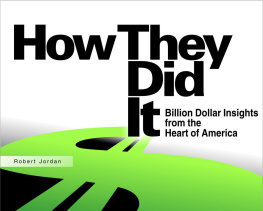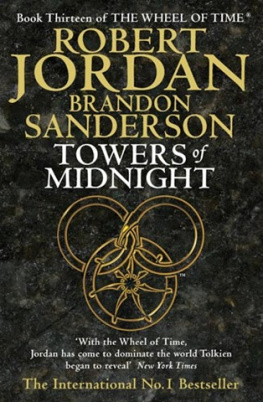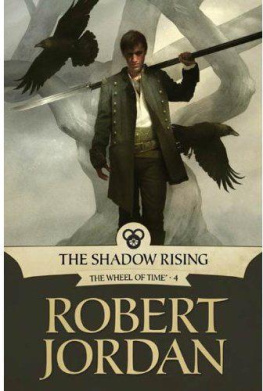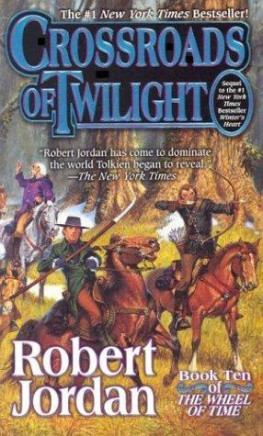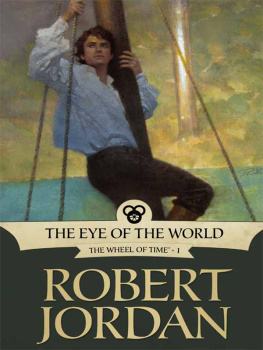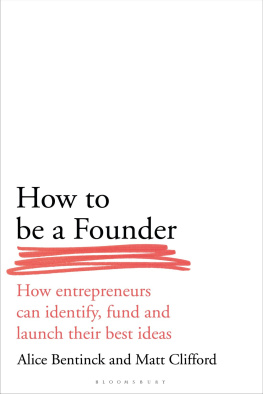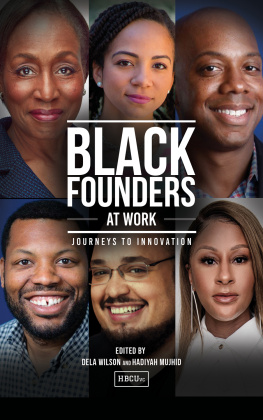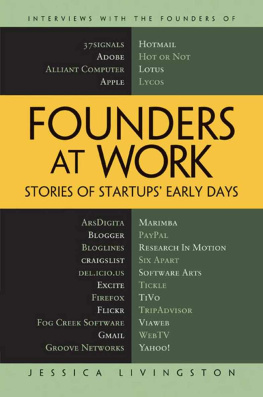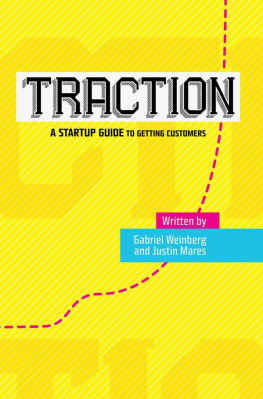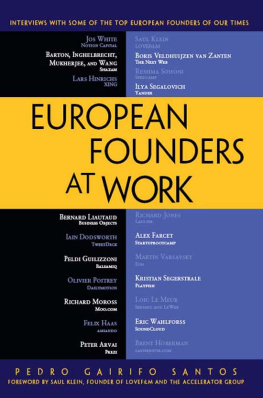Table of Contents
Introduction
Get a quick jolt of inspiration through a collection of selected quotes from How They Did It: Billion Dollar Insights from the Heart of America
Copyright 2010 by Robert Jordan
All rights reserved.
Without limiting the rights under copyright reserved above, no part of this publication may be reproduced, stored in or introduced into a retrieval system, or transmitted, in any form or by any means (electronic, mechanical, photocopying, recording or otherwise), without the prior written permission of both the copyright owner and the publisher of this book.
The scanning, uploading, and distribution of this book via the Internet or via any other means without the permission of the publisher is illegal and punishable by law.
We assume no responsiblity for errors, inaccuracies, omissions, or any inconsistency herein. Any slights of people, places, companies or organizations are unintentional. Readers should use their own judgement in applying any advice, comments or ideas.
First published 2010 by RedFlash Press, a division of RedFlash and InterimCEO, Inc.
RedFlash Press
1450 Techny Road
Northbrook, IL 60062
Phone: +1(847) 849-2800
www.redflash.com
www.howtheydiditbook.com

How They Did It: Billion Dollar Insights from the Heart of America
Robert Jordan
Kindle Edition 1.0, November 2010
Dedication
This book is dedicated to Dick Heise, without whose support I could not have launched my first company, Online Access . There is no finer example of a gracious investor and entrepreneur's champion.
If there are modern day versions of the Medicis, patrons of the arts in Renaissance Italy, those princes would be Rich Heise and Eric Lefkofsky, whose masterful ability to launch and grow companies gave an opportunity to one of their shareholders to pursue his dream of creating and publishing this book.
Introduction
This is a book of thoughts, ideas, and inspiration from 45 of the most successful living company founders to come out of the American heartland. The intention here is a quick jolt of inspiration. The interviews were conducted over the course of 2008 to 2010 and were edited, excerpted, and approved by the founders.
This ebook has been modified from the original graphic design of the printed version. The printed version presented a book of quotes and a running Q & A simultaneously on each page. In this ebook we have presented the Q & A as the first section and separated a collection of quotes as a standalone section -- virtually a second book. The quotes in the second section are almost all taken from within the existing Q & A presented in the first book, but are designed to be a quick read and a quick source of inspiration for you right now.
-Robert Jordan
Part I
The Interviews
Jeff Aronin
Ovation Pharmaceuticals
Illinois

Q: Let's talk about the goat farm for starters.
Aronin: We developed a drug using genetically modified goats to help people whose blood doesn't clot. We insert a strand of human DNA - a protein that creates blood clotting - into a goat embryo's DNA. As the baby goat matures, it can produce this enzyme in its milk. We have a fully FDA - regulated goat farm that produces the ingredient used to make the drug. It's the first transgenic drug ever developed in the world.
Q: The world thinks it understands entrepreneurs, but it's not that easy, is it?
Aronin: It's very difficult to get the same perspective as an entrepreneur if you haven't been one. I would think it would be very difficult to write about it.
Q: Don't get me started. So many CEOs were suggested for this book who didn't start any companies, and our sole focus was, and is, about great company founders.
Aronin: I put it in three categories. First there's family business. Family business has its own set of challenges and can be very tough. But you're not an entrepreneur if you didn't start it. Second, there's the professional manager who's hired to come run something. I don't care if it's Day Five of the company's existence. It's still different than being an entrepreneur. It doesn't mean you can't become one, and I'm not saying one is better or worse. It's just different. And then there's being an entrepreneur. That's what I'm passionate about.
Q: Passion drove you to start Ovation, which you ultimately sold to Lundbeck for $900 million. What's different about an entrepreneur?
Aronin: It's a unique set of skills. The ability to say, "I'm going to bet it all on this." When I started there was nobody to make coffee or take out the garbage. Coming from a Fortune 500 environment, you're giving something up. I believe once you've been an entrepreneur, you can't do anything else. I mean, there's nothing like building and growing.
Q: You're the definition of showing moxie at a young age. While you were in college you took a girlfriend with asthma to the hospital, ended up chatting with the docs, who referred you to pharmaceutical reps because they thought you'd be good at it.
Aronin: I cold-called the reps and said "I don't want anything from you. Just let me drive with you one day. I want to learn more about what you do."
Q: That had to have worked.
Aronin: The rep told the manager, "You gotta hire this guy. He really cares about this, he's passionate." So the rep convinced the manager to hire me. They weren't even recruiting on campus.
Q: That's a great lesson for a new college grad.
Aronin: I needed to differentiate myself. I had already done a summer job selling cable door-to-door. The cable company had full-time people selling, and I did it three to four hours a night at the end of school. I was the number one sales guy in the country against the full-time people for three months out of the summer.
Q: You discovered some secret way to sell cable services?
Aronin: I was just more personable and I worked a lot harder. I didn't go home until I hit a certain number. I liked the whole thing and I started to see how business worked.
Q: Sales aptitude led you to pharma and fast promotion - you became a manager at 23.
Aronin: I loved science, I loved medicine. It was a good place to start. I was with a Fortune 500 company, Carter-Wallace. But they didn't innovate and invest in new growth, which ended up hurting them. I started in sales and quickly became a manager.
Q: How does one advance in pharma?
Aronin: Everybody wants the big brands, everybody wants to be in on the blockbuster drugs, even if you're #11 on a team.
Q: That's not for an entrepreneur.
Aronin: You made your name working on the big brands. But I didn't want to be the 12th man on the big team, so I took on smaller brands and grew them.
Q: You were the champion for an underdog brand. Then came an opportunity to head up marketing at an underdog company.
Aronin: Thanks to great mentors, an opportunity came along, to help out a struggling company, American Health. We were able to grow the business and ultimately sell the company. Some venture guys who'd seen what I did brought me in to run another pharma company called MedCare Health.
Q: How did MedCare Health do?
Aronin: We had some great success, some failures. I learned that the things I could control I did very well. Then there were the things I could not control. The lesson was to try to eliminate or minimize those things. One thing that really struck me was that I had not chosen that company's mission, even though people were betting on me.

